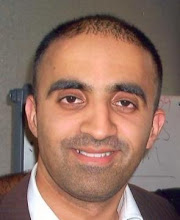
There is a battle going on within Britain's Muslim community between extremists and traditionalists.
Mohammed Shafiq from the Ramadhan Foundation has written a piece for Sky News about the struggles faced in teaching the younger generation:
The Ramadhan Foundation is very clear that when discussing the role of the mosque - we should always pay tribute to the elder community.
When they arrived in the early 1960's there was no mosques or Imams and it was their hard work and sacrifices that enabled future generations to practice our faith in mosques up and down the country.
Having paid this tribute to the elder community we have to understand that the mosques in the UK are failing to address the key concerns of Young Muslims.
Enter any mosque on a Friday and you will surely see young Muslims sitting at the back talking about a host of other things whilst the Imam is preaching.
When I recently questioned some youngsters in my local mosque in Rochdale, I was told that the Imam didn't understand English and they had problems understanding Urdu.
The day after 7/7, I prayed at a mosque in Newcastle. The Imam spoke very passionately about the evil of terrorism and how Islam forbids Muslims from carrying out these murderous acts.
I was moved by his sermon but it was delivered totally in Punjabi. I remember looking around the mosque hall and seeing many youngsters engaged in their own conversations.
The Ramadhan Foundation has for many years been calling for mosques to understand that tackling the issues surrounding terrorism, extremism, cohesion, integration, Islamic values, rule of law etc can only be done in English.
The people who run the mosque have systematically failed to deliver Islamic education to young people that would equip them for the challenges of living in multi-cultural Britain, in a society where we respect each other and live peacefully together.
Speaking to many young Muslims they are desperately in need of muslim scholars and Imams that speak their language and understand the issues facing young Muslims in the United Kingdom.
Whether it is on tackling extremism, preventing terrorism or learning the basic principles of the Islamic faith, Imams must be able to communicate their message into English.
The Ramadhan Foundation accepts that young Muslims must do more to understand their mother tongue as this will keep them in touch with their cultural heritage passed from generation to generation.
So what should mosques do?
:: It should ensure that every sermon is delivered in English along with other languages for the elder community.
:: It should tackle and alert people to the evil of terrorism.
:: It should train young Muslims in running the mosques and then give them the control to run the mosques. When young Muslims see this they will be empowered to get involved more.
:: Ensure that the Mosques are open and transparent, with certified accounts and meetings where decisions are taken openly and those in responsibility are held accountable.
:: Develop a structured curriculum that addresses cohesion, integration, tolerance, respect, tackling extremism and terrorism and contemporary issues such as low educational standards, unemployment, poverty etc.
:: Establish lasting links with other faiths, schools and encourage non Muslims to visit the Mosque
:: Hold regular events in English that help youngsters channel their anger in positive ways, like the issues around double standards in UK foreign policy, illegal war in Iraq etc
:: Promote peaceful coexistence between different diverse communities
With an environment where young people can learn Islam we will be able to tackle many of the key issues facing our country, only together can we defeat terrorism.
The Ramadhan Foundation is hopeful that if mosques carry out the above the Muslim community will be in a much better position than today.
:: Mohammed Shafiq is the Ramadhan Foundation's Press Spokesman and based in Rochdale.
The Ramadhan Foundation is the UK's leading Muslim youth organisation that is working for peaceful co-existence and dialogue for all communities.
Based in Greater Manchester and working to also establish the platform for Muslim unity amongst our communities in the UK.
Mohammed.Shafiq@ramadhanfoundation.com



